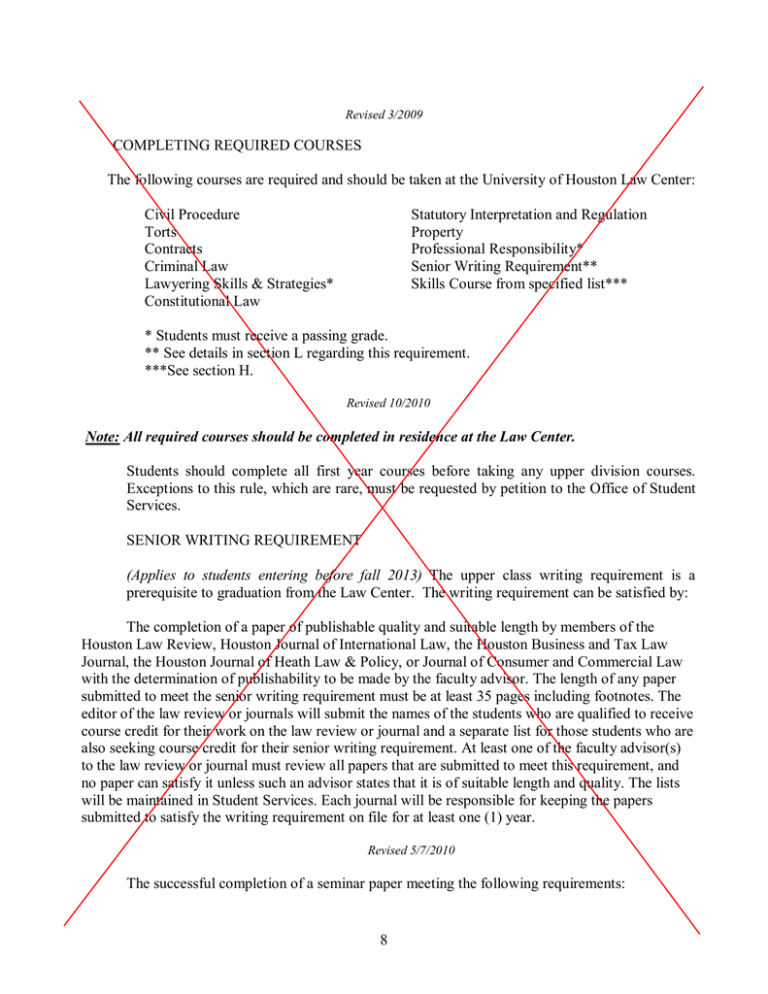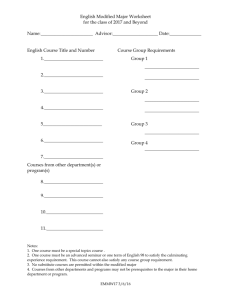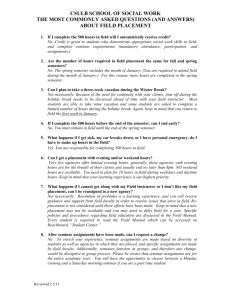COMPLETING REQUIRED COURSES Civil Procedure Statutory Interpretation and Regulation
advertisement

Revised 3/2009 COMPLETING REQUIRED COURSES The following courses are required and should be taken at the University of Houston Law Center: Civil Procedure Torts Contracts Criminal Law Lawyering Skills & Strategies* Constitutional Law Statutory Interpretation and Regulation Property Professional Responsibility* Senior Writing Requirement** Skills Course from specified list*** * Students must receive a passing grade. ** See details in section L regarding this requirement. ***See section H. Revised 10/2010 Note: All required courses should be completed in residence at the Law Center. Students should complete all first year courses before taking any upper division courses. Exceptions to this rule, which are rare, must be requested by petition to the Office of Student Services. SENIOR WRITING REQUIREMENT (Applies to students entering before fall 2013) The upper class writing requirement is a prerequisite to graduation from the Law Center. The writing requirement can be satisfied by: The completion of a paper of publishable quality and suitable length by members of the Houston Law Review, Houston Journal of International Law, the Houston Business and Tax Law Journal, the Houston Journal of Heath Law & Policy, or Journal of Consumer and Commercial Law with the determination of publishability to be made by the faculty advisor. The length of any paper submitted to meet the senior writing requirement must be at least 35 pages including footnotes. The editor of the law review or journals will submit the names of the students who are qualified to receive course credit for their work on the law review or journal and a separate list for those students who are also seeking course credit for their senior writing requirement. At least one of the faculty advisor(s) to the law review or journal must review all papers that are submitted to meet this requirement, and no paper can satisfy it unless such an advisor states that it is of suitable length and quality. The lists will be maintained in Student Services. Each journal will be responsible for keeping the papers submitted to satisfy the writing requirement on file for at least one (1) year. Revised 5/7/2010 The successful completion of a seminar paper meeting the following requirements: 8 The seminar must earn either two or three credit hours. The papers, regardless of credit hours, must be a minimum of 35 pages in length including footnotes. Professors have the discretion to require longer papers than the minimum. (Revised 5/2008) Two or more drafts of the paper must be completed. The paper must be of sufficient quality that it can properly receive a grade no lower than a “C.” The paper must be completed during the semester in which the student enrolled in the course. The sponsoring faculty member must submit the grade by the deadline for all other grades in that semester. Students should ensure that their papers are completed and submitted by the professor’s required deadline. The paper must be original and must demonstrate research, analytical, and writing skills. The paper may not previously have been submitted to any other instructor in connection with any other course at the Law Center or elsewhere, nor may research have been done in whole or in substantial part in connection with a student's outside employment. Planning Completion of the Senior Writing Requirement: While the senior writing requirement may be completed in the third year, second year students are allowed to take seminars. Seminars are rarely offered during the summer. Students are presumed to have had ample opportunity to select a seminar appropriate to their areas of interest. Students may take more than one seminar during their law school careers. Students should not expect to be able to satisfy the senior writing requirement either through an independent study paper or through registration in a seminar or independent study at another law school. Students who apply to complete the balance of their degree requirements at another institution as visiting students and who have not satisfied the senior writing requirement may not be permitted to complete their work elsewhere. Exceptions will be made only where it can be demonstrated that the reason for completing degree requirements elsewhere is unavoidable and the student was not aware in time to have a completed seminar. Upper Level Writing Requirement – (Applies to students entering fall 2013 and after) – To graduate, students must satisfy the Upper Level Writing Requirement. a. The purpose of this requirement is to provide significant faculty instruction in writing to students who have completed the first year of law school and to allow for a diverse writing experience. 9 b. Classes that satisfy this requirement will give substantial focus to writing instruction. Classes may be worth 2 or 3 credit hours. Enrollment will be limited to 14 students/class. c. Either of the following classes satisfy this requirement: 1) Writing Seminars. Students in a Writing Seminar must complete a paper that is original and demonstrates the student’s research and writing skills. Regardless of credit hours, the final version of the paper must be at least 10,000 words, including footnotes. Instructors may require longer papers. 2) Writing Courses. Students in a Writing Course must complete several kinds of practical writing assignments. These may be expository exercises (e.g., drafting client letters, research memoranda, court documents, and short articles similar to those that appear in bar journals) or transactional or litigation drafting assignments (e.g., contracts and other business agreements, wills or other estate planning instruments, pleadings, and discovery documents). Assignments must be no more than 2,500 words each, when feasible. Instructors have discretion over the kind and number of assignments students complete; however, students must complete at least 5,000 words of writing over the course of the semester. d. For all classes that satisfy this requirement, at least one draft of every assignment must be completed, though prior drafts need not be as long as, and may be in a different form than, the final version students submit. Faculty will provide detailed feedback to students on prior drafts. In addition to completing at least one draft, students will turn in a final version of every assignment. e. Classes that satisfy this requirement can be taken in the second year but preference in class selection is given to third year students. f. All writing assignments must be completed during the semester in which the student is enrolled in the class. g. Students may not submit work they previously completed in any prior class. h. Students must receive a grade no lower than a “C” in the course. i. Students who apply to complete the balance of their degree requirements at another institution as visiting students and who have not satisfied this requirement might not be permitted to complete their work elsewhere. The decision rests with the dean’s office. Revised 8/2013 10




